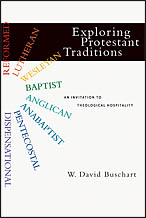David Buschart: Exploring Protestant Traditions
 W. David Buschart, Exploring Protestant Traditions: An Invitation to Theological Hospitality (Downers Grove: InterVarsity Press, 2006), 373 pages, ISBN: 083082832X.
W. David Buschart, Exploring Protestant Traditions: An Invitation to Theological Hospitality (Downers Grove: InterVarsity Press, 2006), 373 pages, ISBN: 083082832X.
This book skillfully explores a number of contemporary Protestant traditions by tracing their historical and ecclesiastical backgrounds, their theological and hermeneutical methods, and their characteristic beliefs. Buschart offers the reader “an invitation to theological hospitality,” and this is perhaps the best metaphor to describe the scope and intentions of the book. The considerable theological diversity among just the Protestant traditions make this work a valuable resource and ecumenical field guide. For those familiar with the Protestant heritage, Exploring Protestant Traditions offers an organized way to access and compare significant information; for those unacquainted with Protestantism, the book presents a valuable and reliable introduction to the classical theological traditions.
The book concludes with a call to theological hospitality. Buschart surveys Lutheran, Anabaptist, Reformed, Anglican, Baptist, Wesleyan, Dispensational, and Pentecostal traditions. Obviously there are more traditions within Protestantism, not to speak of the larger ecumenical world of Roman Catholic and Eastern Orthodox Christianity. The mere existence of these divisions bespeaks the dilemma of Christian relationships and the sinfulness that attends the emergence of ever new denominations. Buschart, among many others, upholds hospitality as an antidote to polarization and divisions among the churches. Christian hospitality, emulating the hospitality of God toward humankind, has made it obligatory for Christians to pursue meaningful and honest relationships with one another. “A tradition of theology that flows from God’s preemptive hospitality,” Buschart argues, “is a good gift and … a resource for, not an enemy of, Christian hospitality” (264). In this sense, the book is likely to introduce the reader to more strangers than friends. And it is precisely the call to embrace the stranger that stand at the heart of the Christian life of hospitality.

W. David Buschart (PhD, Drew University) is associate dean and professor of theology and historical studies at Denver Seminary.
The introduction of the book defends the use of the term “Protestant traditions.” Nonetheless, a number of readers may prefer not to find themselves described as “Protestant,” because the term indicates particular historical events and theological convictions with which they do not identify. Pentecostals may by particularly well-known among this group. Historically, Pentecostals did not participate in the movements of Reformation and Counterreformation that swept Western Christendom. More precisely, Classical Pentecostals were ostracized and persecuted by the major Protestant traditions in North America, and an association with Evangelicalism did not develop until after World War II. On the other hand, Pentecostals have also disassociated themselves from Roman Catholicism and Eastern Orthodoxy. To describe Pentecostalism as “Protestant” is historically, ecclesiastically, and theologically incorrect. It may suggest that Pentecostals somehow “fit” better with Protestant Christianity. On the other hand, if Pentecostalism is a universal movement of the Holy Spirit, then we may find Pentecostals in all major Christian traditions with no particular “Pentecostal” identity.
Category: Ministry, Winter 2008


